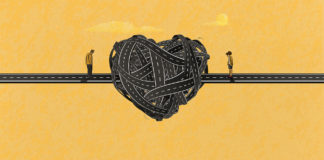The dictatorship of tolerance
"Borg creatures. A highly advanced race of predators. They have no conscience. No ethic. Chances are, it has already infected your community, your schools, your church—even your children. This real-life threat is called 'the new tolerance', a simple phrase that describes a complex modern doctrine" (Josh McDowell).
During the commercial breaks, happiness walks barefoot
"Once upon a time there was a man who lived in Scarcity. After many adventures and a long journey through Economic Science, he met the Affluent Society. They married and had lots of needs." (Jean Baudrillard)
How to grow together with God
We’d been married only a few weeks when we discovered that growing our spirituality as a couple was going to be much more complicated than the instructions on the packet suggested.
Love does not give up
We love people for who they are. But there is a kind of love that is too high for us to truly comprehend in all its nuances, a love that manifests itself towards people no matter who they are or what they become. We find a love such as this in the beautiful story of Ian and Larissa.
Silence after the storm: Friendship, between quarrels and forgiveness
Eskimos don't have the word "quarrel" in their vocabulary. They live in a particularly harsh climate, so no one wants to risk getting pneumonia (or dying) just to prove that they are right.
She loves me not | Friendship and the friend zone
When I was a child, I used to take a branch of locust tree and, plucking the leaves one by one, I would say: She loves me… she loves me not… she loves me… she loves me not. I cannot remember who I was thinking of when doing this; too many years have gone by since then. However, the refrain is still very...
Introverts and their road to success
They would rather work alone or in small teams, they do not wish to draw attention, they love quiet, less stimulating environments, and they need time to make decisions. With this general profile, introverts seem to have a slim chance of prospering in a society that usually rewards extroverts—unless they learn to harness their strengths.
Are you a workaholic?
By 2030, epidemics will be eradicated; life, rejuvenated by injections, giving lifespans of 150 years; and cars almost obsolete with aeroplane ownership common. These were the 1930 predictions of FE Smith, a British politician and friend of Winston Churchill.
Real information is dialogue
I request from my colleagues at the ST.N editorial office at least three sources for news and at least two books for the analysis topics: one for and one against. Ideally, the reading of the first two books will give rise to the desire to look for at least two more, so that the differences are clearer. After that, there will be a...
COVID-19 and our low-risk but endangered children
All COVID-19 statistics lead to the same conclusion: the young ones, our children, are at the lowest risk of getting ill or dying from the virus. That’s comforting. But the pandemic does pose a certain danger to them.
Cut from a different cloth
When I look at the lives of some people, I can't help but wonder if they are cut from a different cloth to most of us. Their courage in the face of challenges, their resilience, their vision and their achievements are so impressive that my imagination wonders what the world would look like if their passion were multiplied.
Teenage depression and rebellion: a parent’s worst nightmare
Both specialist research and common experience tell us how complicated it is when children reach adolescence. Dr Bryan Craig helps us to understand the reasons for this and how to turn the crisis into an opportunity for growth.
Facebook, the Metaverse and a falsely promised future
Facebook is dead! Long live Metaverse! So proclaimed Facebook CEO Mark Zuckerberg to thousands of followers who tuned in to a livestream last Friday announcing the company’s rebrand.
Family crisis does not wear a mask during a pandemic
Many families who feared that the new coronavirus would affect their health ended up dreading its effect on something seemingly even more difficult to protect: the well-being of their relationship.
Edson White | Education between teaching and betrayal
In 1867, when Edson White was 18 years old and working at the Adventist type-room in Battle Creek, Michigan, he had a transformative conversation with Mr Bell.


























